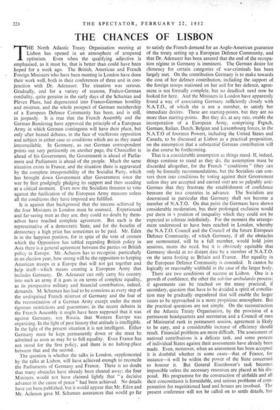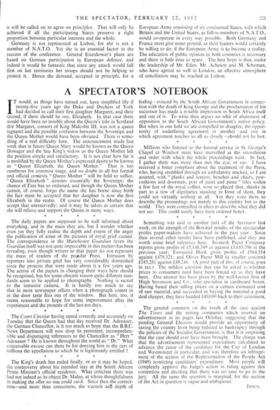THE CHANCES OF LISBON T HE North Atlantic Treaty • Organisation
meeting at Lisbon has opened in an atmosphere of tempered optimism. Even when the qualifying adjective is emphasised, as it must be, that is better than could have been hoped for a week ago. The British, American and French Foreign Ministers who have been meeting in London have done their work well, both in their conferences of three and in con- junction with Dr. Adenauer. The situation was serious. Gradually, and for a variety of reasons, Frdnco-German cordiality, quite genuine in the early days of the Schuman and Pleven Plans, had degenerated into Franco-German hostility and mistrust, and the whole prospect of German membership of a European Defence Community has been, and is still, in jeopardy. It is true that the French Assembly and the German Bundestag have approved the principle of a European Army in which German contingents will have their place, but only after heated debates, in the face of vociferous opposition and subject in either case to conditions which are as they stand irreconcilable. In Germany, as our . German correspondent points out very pertinently on another page, the Chancellor is ahead of his Government, the Government is ahead of Parlia- ment and Parliament is ahead of the people. Much the same situation exists in France, and the situation there is aggravated by the complete irresponsibility of the Socialist Party, which has brought down Government after Government since the war by first grudgingly pledging its support and then seceding at a critical moment. Even now the Socialists threaten to vote against the ratification of the European Army measure unless all the conditions they have imposed are fulfilled.
It is against that background that the success achieved by the four Ministers in London must be assessed. Experienced and far-seeing men as they are, they could no doubt by them- selves have reached complete agreement. But each is the representative of a democratic State, and for the benefits of democracy a high price has sometimes to be paid. Mr. Eden is in the happiest position, for in spite of the vote of censure which the Opposition has tabled regarding British policy in Asia there is a general agreement between the parties on British policy in Europe. Mr. Acheson has to recognise, particularly in an election year, how strong will,be the opposition to keeping American troops in a Europe that will not get together and help itself—which means creating a European Army that includes Germany. Dr. Adenauer can only carry his country into such an army if it goes in on terms of complete equality, as its prospective military and financial contribution, indeed, demands. M. Schuman has had to be conscious at every step of the undisguised French mistrust of Germany and the fear of the reconstitution of a German Army except under the most rigorous restrictions and guarantees; in the recent debates in the French Assembly it might have been supposed that it was against Germany, not Russia, that Western Europe was organising. In the light of past history that attitude is intelligible. In the light, of the present situation it is not intelligent. Either Germany must be kept permanently down or she must be admitted as soon as may be to full equality. Even France has not stood for the first policy, and there is no halting-place between that and the second.
The question is whether the talks in London, supplemented by the talks at Lisbon, will have achieved enough to reconcile the Parliaments of Germany and France. There is no doubt that many obstacles have already been cleared away; the four Ministers would not have claimed lightly that " a decisive. advance in the cause of peace" had been achieved. No details have yet been published, but it would appear that Mr. Eden and Mr. Acheson gave M. Schuman assurances that would go far to satisfy the French demand for an Anglo-American guarantee of the treaty setting up a European Defence Community, and that Dr. Adenauer has been assured that the end of the occupa- tion regime in Germany is imminent. The German desire for clemency for certain categories of war-criminals has been largely met. On the contribution Germany is to make towards the cost of her defence contribution, including the support of the foreign troops stationed on her soil for her defence, agree- ment is not formally complete, but no deadlock need now be looked for here. And the Ministers in London have apparently found a way of associating Germany sufficiently closely with N.A.T.O., of which she is not a member, to satisfy her immediate desires. These are starting-points, but they are no more than starting-points. But they do, at any rate, enable the incorporation of a European Army, comprising French, German, Italian, Dutch, Belgian and Luxembourg forces, in the N.A.T.O of fourteen Powers, including the United States and Canada, to be discussed' at Lisbon as a practical proposition, on the assumption that a substantial German contribution will in due course be forthcoming.
That is a considerable assumption as things stand. If, indeed, things continue to stand as they do, the assumption must be discarded altogether, for the French " conditions " (they can only be formally recommendations, but the Socialists can con- vert them into conditions by voting against their Government unless they are accepted and carried out) are. so palpably anti- German that they frustrate the establishment of confidence between the two countries in advance. The Socialists are determined in particular that Germany shall not become a member of N.A.T.O. On that point the Germans have shown considerable moderation, but their prolonged exclusion would put them in a position of inequality which they could not be expected to tolerate indefinitely. For the moment the arrange- ment understood 'to have been reached in London, whereby the N.A.T.O. Council and the Council of the future European Defence Community, of which Germany, if all the obstacles are surmounted, will be a full member, would hold joint sessions, meets the need, but it is obviously equitable that Germany should at no distant date be a member of N.A.T.O. on the same footing as Britain and 'France. Her equality in the European Defence Community is conceded. It cannot be logically or reasonably withheld in the case of the larger body.
There are two conditions of success at Lisbon. One is a growth of confidence, the other the solvitur ambulando process; if agreements can be reached on the many practical, if secondary, question that have to be decided a spirit'of concilia- tion may be gradually engendered that will enable the larger issues to be approached in a more propitious atmosphere. But the practical questions are not simple. On the reconstruction of the Atlantic Treaty Organisation, by the provision of a permanent headquarters and secretariat and a Council of men of Ministerial rank in permanent session, agreement is likely to be easy, and a considerable increase of efficiency should result. Financial problems are more difficult. The assessment of national contributions is a delicate task, and some protests of individual States against their assessments have already been made. Even, moreover, when an assessment has been accepted it is doubtful whether in some cases—that of France, for instance—it will be within the power of the State concerned to honour it. But General Eisenhower's task becomes impossible unless the necessary resources are placed at his dis- posal. His programme for the construction of airfields and all their concomitants is formidable, and serious problems of com- pensation for requisitioned land and houses are involved. The present conference will not be called on to settle details, but it will be called on to agree on principles. That will only be achieved if all the participating States preserve a right proportion between particular interests and the whole.
Germany is not represented at Lisbon, for she is not a member of N.A.T.O. Yet she is an essential factor in the success of the conference. General Eisenhower's plans are based on German participation in European defence, and indeed it would be fantastic that since any attack would fall first on her territories her troops should not be helping to protect it. Hence the demand, accepted in principle, for a European Army consisting of six continental States, with which Britain and the United States, as fellow-members of N.A.T.O., would co-operate in every way possible. Both Germany and France must give some ground, as their leaders would certainly be willing to do, if the European Army is to become a reality. The education of public opinion in both countries is necessary and there is little time to spare. The best hope is that, under the leadership of Mr. Eden, Mr. Acheson and M. Schuman, who have agreed so well in London, an effective atmosphere of conciliation may be reached at Lisbon.



































 Previous page
Previous page